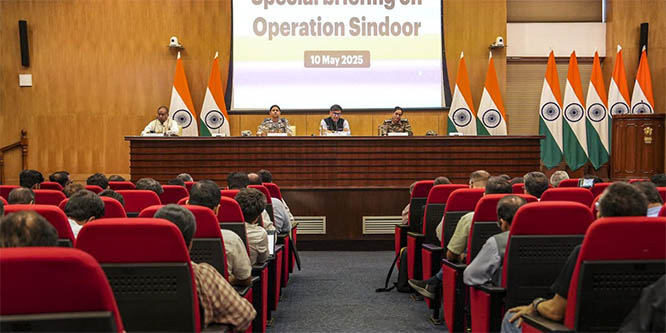Riyadh, May 5: Saudi Arabia on Saturday intercepted and destroyed a ballistic missile near Riyadh’s international airport after it was launched from conflict-torn Yemen, in an escalation of the kingdom’s war against Houthi rebels.
The missile attack was the first aimed by the Shiite rebels at the heart of the Saudi capital, underscoring the growing threat posed by the raging conflict in Yemen.
A loud explosion was heard and smouldering debris landed inside the King Khalid International Airport, just north of Riyadh, after the missile was shot down but authorities reported no major damage or loss of life.
“This evening a ballistic missile was fired from Yemeni territory towards the kingdom,” the Saudi Press Agency quoted coalition spokesman Turki al-Maliki as saying late Saturday.
“The missile was launched indiscriminately to target the civilian and populated areas. Shattered fragments from the intercepted missile landed in an uninhabited area of the airport and there were no injuries,” he added.
Houthi rebels, who fired the missile from Yemeni territory more than 1,200 kilometres (750 miles) from Riyadh, said they were targeting the airport, according to the Houthis’ Al-Masirah television channel.
Civil aviation authorities said the airport was functioning normally and that flights were operating as scheduled, though residents said security vehicles had closed off some roads.
Saudi forces have shot down Houthi missiles before with Patriot surface-to-air missiles purchased from the United States, but few have come so close to a major population centre.
The brazen attack could escalate the proxy conflict between Riyadh and Tehran in Yemen.
The bitter regional tensions were underlined earlier Saturday when Lebanon’s Saudi-allied Prime Minister Saad Hariri resigned while on a trip to Riyadh, citing Iran’s “grip” on his country and threats to his life.
The missile attack highlights how the war in Yemen is increasingly spilling across the border since a Saudi-led coalition began its military intervention in 2015.
Saudi Arabia led the intervention to prop up the government of President Abedrabbo Mansour Hadi after the Huthi rebels forced him into exile.
But two years later, the kingdom appears to be in a quagmire. Hoping for a quick victory against what it saw as Iranian expansionism in its back yard, Riyadh has so far been unable to remove the Houthis from Yemeni capital Sanaa.
Aside from occasional missiles, Saudi territory has also been hit repeatedly by the rebels’ cross-border incursions, raising fears the conflict could drag out yet further.
In towns along the southern border, thousands of mortar rounds and crude rockets have struck schools, mosques and homes, forcing thousands to be evacuated.
Saudi Arabia does not officially disclose military fatalities, but state media has frequently featured funeral notices for “martyred” soldiers.
United Nations-backed talks have failed to broker a political settlement to end the fighting in Yemen, which has left more than 8,600 people dead since the coalition intervened.
A cholera outbreak has claimed more than 2,100 lives in Yemen since April as hospitals struggle to secure supplies amid a coalition air and sea blockade. The UN has warned that Yemen now stands on the brink of famine.








Comments
Add new comment